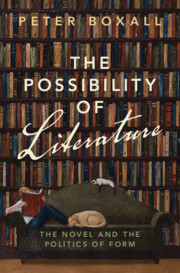Book contents
- The Possibility of Literature
- The Possibility of Literature
- Copyright page
- Dedication
- Epigraph
- Contents
- Figures
- Acknowledgements
- Introduction
- Part I On Writers
- Part II On Literary History
- Part III On the Contemporary
- Chapter 12 Imagining the Future in the British Novel
- Chapter 13 Shallow Intensity
- Chapter 14 To Carry Now Away
- Chapter 15 On Rereading Proust
- Notes
- Bibliography
- Index
Chapter 13 - Shallow Intensity
Neoliberalism and the Novel
from Part III - On the Contemporary
Published online by Cambridge University Press: 10 October 2024
- The Possibility of Literature
- The Possibility of Literature
- Copyright page
- Dedication
- Epigraph
- Contents
- Figures
- Acknowledgements
- Introduction
- Part I On Writers
- Part II On Literary History
- Part III On the Contemporary
- Chapter 12 Imagining the Future in the British Novel
- Chapter 13 Shallow Intensity
- Chapter 14 To Carry Now Away
- Chapter 15 On Rereading Proust
- Notes
- Bibliography
- Index
Summary
This essay responds to the perception that later twentieth-century experience underwent a shallowing of intensity – what Fredric Jameson famously diagnosed as a ‘waning of Affect’.
The essay reads this shallowing, as it is represented in the novel of the period, and as it reflects the logic of late capitalism, and of neoliberal culture. But while it examines the ways in which the novel partakes of this logic, it suggests at the same time that the experience of shallowness itself yields a particular kind of intensity, one which is at odds with its affective weakening. If we are to understand the relation between late capitalism, neoliberalism and waning of affect, we have to address the ways in which shallowness become its own kind of intensity – in which shallowness and intensity enter into a shifted relation with one another.
Reading the later twentieth-century novel from Philip Roth to Muriel Spark to Margaret Atwood to James Kelman, the essay argues that we can see a form of fictional expression emerging at this time, in which the novel does not abandon its commitment to forms of political intensity, but in which it rewrites the given relations between the weighty and the trivial, between weakening and intensifying, between fiction and reality.
Keywords
- Type
- Chapter
- Information
- The Possibility of LiteratureThe Novel and the Politics of Form, pp. 275 - 290Publisher: Cambridge University PressPrint publication year: 2024

